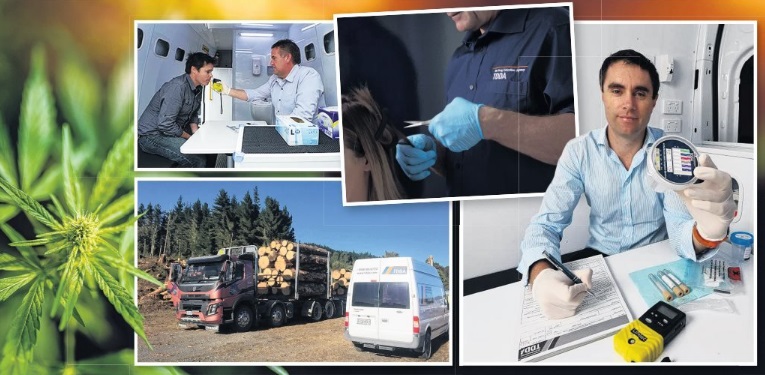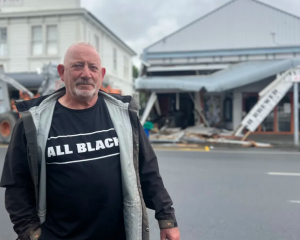
There are major concerns among industries with drug testing regimes that more workers will fail tests if cannabis is legalised later this year.
New Zealanders will decide whether to legalise recreational marijuana at next month’s election.
If there is a "yes" vote and if the legislation then becomes law, how workplaces measure impairment will be the big question for a lot of employers.
"The meat processing industry views cannabis reform as having significant implications for workplace health and safety," Meat Industry Association chief executive Sirma Karapeeva said.
"People impaired by any substance who are working in an environment with knives, saws or driving vehicles present a serious risk to themselves and others."
She said meat processing companies viewed the referendum and potential law change around cannabis "extremely seriously".
It is not easy for companies to identify impaired workers, Ms Karapeeva said, and that is concerning.
"While many of our members currently conduct pre-employment, random and just-cause testing for cannabis, a significant increase in usage may result in many more impaired employees working without detection.
"The other concern for employers in the industry is the impact on employee wellbeing from increasing levels of drug use."
Tony Gamble runs Gamble Forest Harvesting Ltd in Dunedin.
He too, is concerned about more usage leading to increased impairment at work.
"It’ll be legal to consume but how are we going to measure impairment? That’s my biggest concern. If you legalise something, it’s still not right, but somebody can be in the workplace impaired. Have they got the answers there? I don’t think they have, to be honest."
Forestry had had a good drug testing regime for a long time, Mr Gamble said.
"We’ve probably prospered from that.
"I’d imagine it’s cleaned up the industry pretty well over the years.
"It doesn’t mean they don’t have workers that test positive but you’ll get that in any workplace."
At Port Otago about a year ago five staff failed drug tests. But not for cannabis.
"Given we had a number of staff test positive for meth around about 18 months ago, we had a bit of a run of it," Port Otago chief executive Kevin Winders said.
"Pleased to say that’s clearly had some benefit in we haven’t had anyone test [positive] for meth in over 12 months, which is great."
Mr Winders now feels confident in the way they have communicated to staff the importance not to let drugs or alcohol impair their performance.
"We’ve got a pretty mature and capable workforce that are well used to this environment.
"They’re well seasoned and experienced. Would that change in legislation mean a significant uptake in drug use? I personally doubt that.
"Our team are well aware of their obligations and understand their requirements so I’d expect them to carry on in the manner they operate today in respect of the law change."
The staff worked in a high-risk environment, which meant being well at work was vital.
"... they’re driving heavy machines — 60-tonne machinery — and it’s a high-risk environment.
"Clearly to drive a 60-tonne bit of kit that’s worth a couple of million dollars, it’s critical our staff have all faculties and are not drug-impaired."
Like most workplaces with a drug and alcohol policy, the port does random drug testing, pre-employment checks and if there is an incident.
"That will continue irrespective of the law change."
It can be hard to get good, experienced scaffolders. Brazier Scaffolding chief executive Glen Brazier was worried he might lose staff if marijuana is more widespread.
Mr Brazier said if a worker — no matter how important to the company — failed a test they would have to be dismissed.
"Unfortunately we have a one strike you’re out ... because of the nature of the industry we’re in.
"We can’t afford to take that risk with anyone. It’s the same rule for everyone."
Brazier Scaffolding drug-tested all the time, and it was not uncommon now to find good candidates that failed drug tests.
"... it is concerning from an employer’s point of view.
"We do strike a few candidates that have applied for jobs that haven’t been able to pass pre-employment testing.
"I’m sure I’m not the only one with those concerns."
The testers
The Drug Detection Agency (TDDA) is one of the go-to drug testers for many companies that have to test for health and safety reasons.
TDDA chief executive Kirk Hardy says on average their testing in New Zealand has a positive rate for cannabis of about 5.8%.
For pre-employment tests the average is lower, at about 4%.
Cannabis is king in Otago, as the most common drug found in people’s systems, followed by methamphetamine and opiates.
Mr Hardy expects more positive tests to follow cannabis legalisation.
"We’ve seen ... the data coming out of the US, where they had a 75% increase of positive rates for marijuana.
"From 5.1% and it went to 8.9% for positive marijuana use, which is a huge [increase]."
The big question of impairment was not easy for the drug testers either, Mr Hardy said.
"No toxicology can detect impairment.
"With cannabis it’s a really, really tricky substance. If you look at it, you’ve got what’s called intoxication and then you’ve got what’s called impairment.
"Intoxication is when you’re high. The best way to describe it is the analogy of alcohol. You drink alcohol, you’re feeling pretty happy — you’re intoxicated by it. The next day you get what’s called a hangover ... you’re impaired.
"You’re impaired during intoxication and you’re impaired after that in the hangover effect.
"Exactly the same thing applies to cannabis."
He warns some studies have shown impairment can last for weeks after smoking cannabis.
But if someone is only dabbling in a little cannabis on the weekend, it will probably not show up in a test on the following Monday.
"If someone’s having ... a couple of tokes of a joint on a Friday or a Saturday night, they are more than likely going to test negative in the workplace on Monday through urine analysis.
"They will definitely test negative with oral fluid, or saliva testing," he said.
The Drug Foundation
The Drug Foundation executive director Ross Bell described testing for impairment as a "weakness".
"There isn’t good technology available to workplaces at the moment around measuring impairment."
Somebody might smoke cannabis on the weekend and pass a Monday test, but, they might also fail that Monday test a few weeks later, Mr Bell said.
"The only testing regime are urine tests, which test for presence. Someone could have smoked five weeks ago and still fail a test."
He said the current testing regime was inadequate but there was potential with saliva testing.
"Because that tests for more recent use, within the last few hours, that could be a system."
He had his reservations about that, as well.
"I can’t see a workplace, that even if there was saliva technology, that every morning ... you’re going to get all of your 100, 200 or 300 staff to do a saliva test."
His advice is to work on a culture of understanding around drug use and how it may affect performance.
"Don’t just rely on building a testing regime. Rely on building a culture, a culture that says don’t come to work if you’re impaired, whether you’re hungover or tired or stressed ... if you’re not in the right state of mind, don’t come to work."
He said employers needed to communicate why they needed systems like drug testing.
"We’ve done work with the Defence Force where they had this zero-tolerance approach and staff didn’t really understand what that meant.
"They had never communicated the rationale for taking a strong approach. Workplaces need to educate their staff: ‘we care about you, we want you to stay staff, we want you to look after your workmates, you’re in a risky environment — this is why we can’t have you showing up with your performance impaired’."
Overall, drug testing sent a bad message to workers and a culture of safety was always a better way to manage drug use, he said.
"There’s a real weakness with drug testing, not just in the technology but in the message it sends to workers: ‘we don’t trust you, we need you to pee in this cup and we’re going to catch you out’.
"That doesn’t make for a good working relationship between employer and employees."
He said the cannabis referendum was a good chance to engage with staff on the issue, to try to build that safety culture.
Comments
Having worked in the meat industry where there was random and reasonable cause drug testing carried out I don't see the problem. Whether it's alcohol, cannabis, meth, cocaine or heroin people have always turned up for work under the influence. Mostly they are noticed by their workmates and they are dobbed in. Nobody wants to work alongside someone who is likely to injure them . Employers may have to, horror of horrors, spend a little more on making the workplace safe for their employees but it's nothing new that people should be afraid of.
Legalised use would have new problems. Relying on 'dobbing in' is not a goer in the industrial workplace.
No longer will workers have to suffer the indignity of having to punch a time-card when starting work ... all they'll have to do when the legislation passes, is open wide, have a prick in the arm and pee in a pottle ... much more civilized !!
I personally see nothing positive whatsoever about legalising marijuana. There will be problems - physical, social and mental - in all areas of our country and there's no way they can or will be mitigated by any law change...













